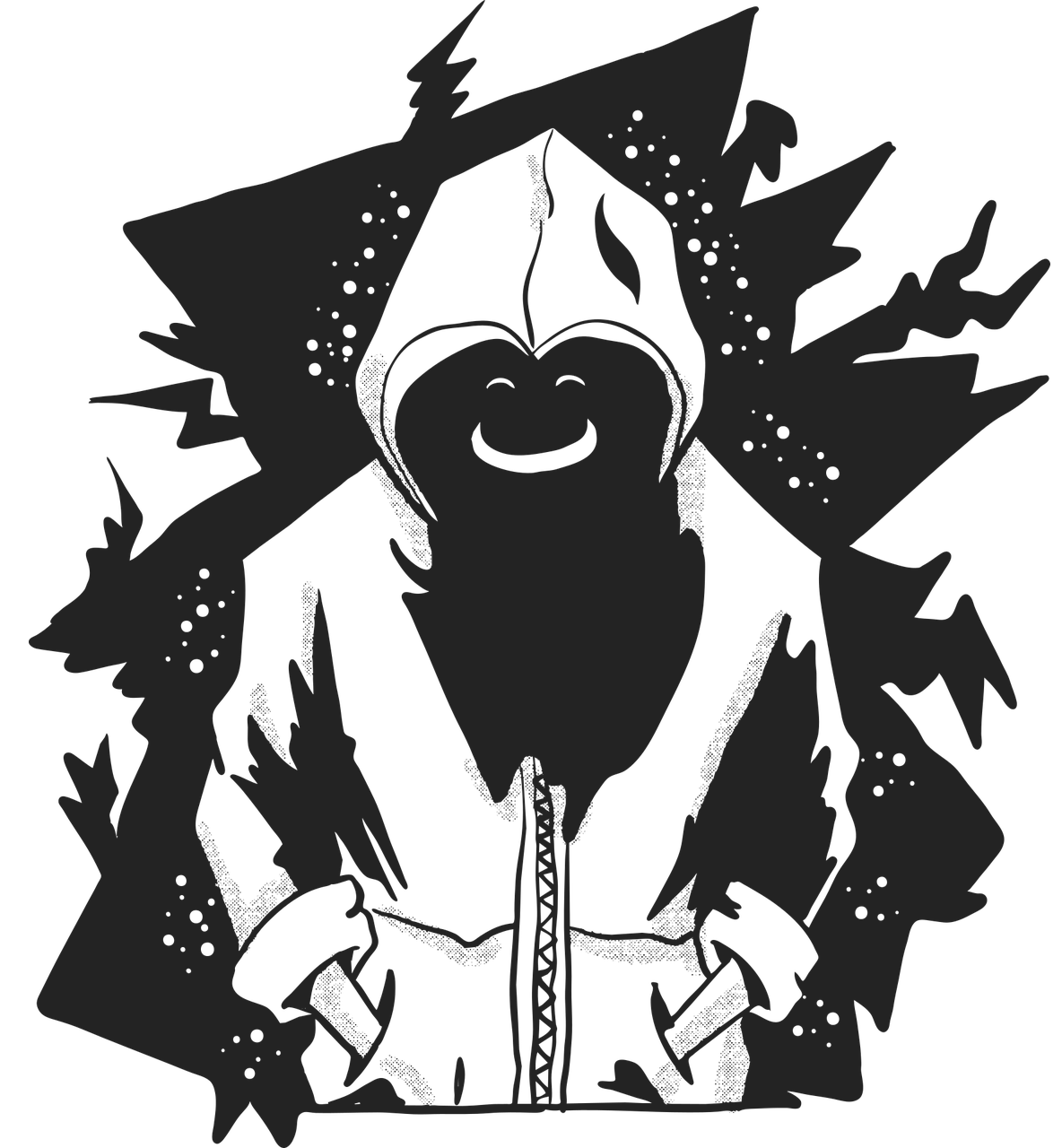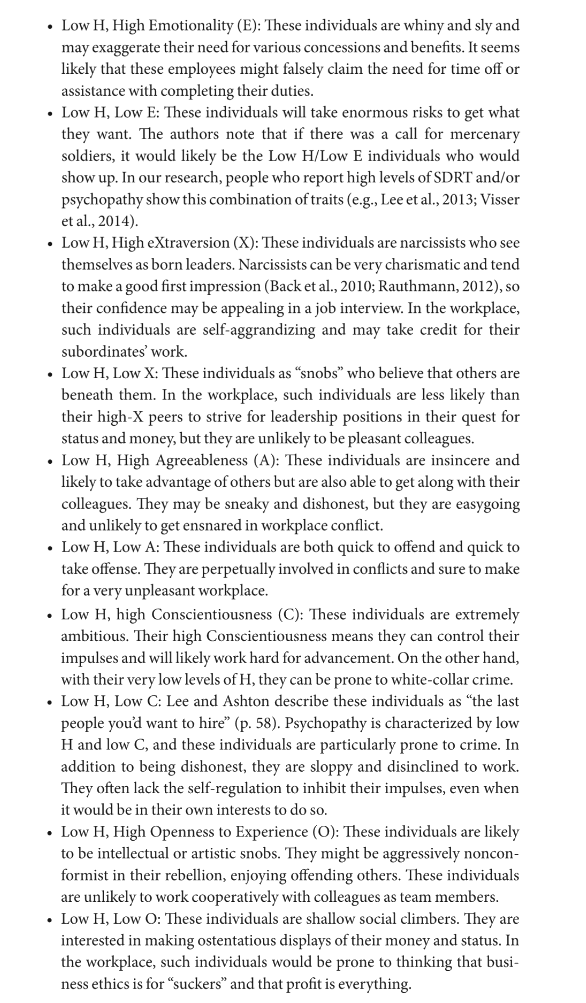Things I know about Things

Dark Triad

"... narcissistic and Machiavellian individuals appear to possess intact - or even enhanced - cognitive empathic faculties... As cognitive empathy refers to the process by which we adopt another person's perspective..."
Read more
"... may confer fitness benefits to the individual in particular environments."
"... narcissists... are likely to enter into conflict... "
"Zeiger-Hill and Marcus (2016) argued that personality traits should be considered dark when "they are linked with interpersonal difficulties across a variety of contexts even when only modest levels of these features are present..."
"Have difficulties understanding their emotional experiences... struggle with accepting negative emotions, often having negative secondary emotions in response to their feelings..."
In this they argue for more dark triad traits outside of the core three of; sadism, spitefulness, status-driven risk taking, egoism, moral disengagement, psychological entitlement, and self interest.
"In relation to the Dark Triad, the most relevant Big Five/FFM factor is Agreeableness... provided evidence that the traits associated with the core of the Dark Triad were not distinictive from low agreeableness (ie, antagonism).
"In the HEXACO framework, eXtraversion, Conscientiousness, and Openness to experience are quite similar to their Big Five/FFM counterparts. However, Emotionality and Agreeableness represent rotated versions of Big Five/FFM Neuroticism and Agreeableness, respectively. The anger/hostility aspects of Big Five/FFM (high) Neuroticism are encompassed by HEXACO (low) Agreeableness. Honesty-Humility overlaps with Big Five/FFM Agreeableness but also contains unique content that is not accounted for within the Big Five/FFM."
"Paulhaus and Williams noted that all three Dark Triad traits were characterized by low Big Five Agreeableness... however Visser... found that though Machiavellianism, psychopoathy and SDRT [Status-Driven Risk Taking] were characterized by low Big Five Agreeableness, narcissism was not."
"Other core explanations for the common element of the Dark Triad are callousness... a fast and exploitative life history strategy... and HEXACO Honesty-Humility..."
"Despite the widespread perception of Dark Triad traits as maladaptive, Jonason et all (2012b) argued that these traits would have some benefits that would be associated with reproductive fitness..."
"HEXACO best accounted for the overlap between the Dark Triad (Book et al., 2015). While low Honesty-Humiity was most central, low Emotionality, Agreeableness and Conscientiousness and high eXtraversion were also relevant."
"Not all of the dark personality traits were most strongly charactized by low Honesty-Humility (Book et al., 2016). Narcissism, for example, was most strongly related to high eXtraversion, and everyday sadism was highly related to low Emotionality as well as low Honesty-Humility."
""
Read more
"... 'oppositional-defiant disorder' (ODD) and 'conduct disorder' (CD)..."
"... it was found that 1.4% (girls) to 3.2% (boys) showed a persistent pattern of angry/irritable mood, argumentative/defiant behavior, and vindictiveness, which are key features of ODD, while 0.8% (girls) and 2.1% (boys) displayed an enduring pattern of excessive aggression to people and animals, destruction of property, deceitfulness or theft, and serious violations of rules, which are defining symptoms of CD..."
"... externalizing problems can best be conceptualized in terms of two statistically independent dimensions: 'overt versus covert' and 'destructive versus non-destructive', which yield four types of disruptive behavior: (1) oppositionality (overt/non-destructive; e.g., anger, stubbornness, argumentativeness), (2) aggression (overt/destructive; e.g., spitefulness, fighting, bullying), (3) property violations (covert/destructive; e.g., vandalism, stealing, setting fire), and (4) status violations (covert/non-destructive; e.g., truancy, running away, breaking rules)."
"ODD was characterized by high levels of oppositionality and moderate levels of aggressive behaviors, whereas CD was typified by high levels of oppositionality, aggression, and property violations, and lower but (compared to ODD) still elevated levels of status violations..."
"... there were robust genetic effects on both ODD and CD with only modest evidence for shared environmental influences."
"Externalizing problems have first of all been linked to a reactive temperament that is typified by high levels of anger and intolerance to frustration..."
"The results of these investigations have indicated that both the Dark Triad traits and honesty-humility account for a statistically significant proportion of the variance in aggression... and malevolent tendencies in relation to domains of sex, power, and money..."
"The Dirty Dozen for Youth... The HEXACO-Middle School Inventory... The Youth Self-Report [Achenbach]... correlations were calculated to investigate relations among all questionnaires scores, and in particular between Dark triad traits and the HEXACO factor of honesty-humility on the one hand and symptom scores of ODD and CD on the other hand..."
"... no significant correlations were noted between age and the questionnaire scores...
"Correlations (corrected for gender) among the Dark Triad traits (DD-Y), honesty-humility and other personality factors (HEXACO-MSI), and externalizing problems (YSR)... were positively and significantly correlated with symptoms of both ODD (rs between 0.34 and 0.48, ps < 0.001) and CD (rs between 0.39 and 0.60, ps < 0.001), whereas the honesty-humility factor of the HEXACO displayed a negative correlation with both types of externalizing problems (rs being −0.40 and −0.61, respectively, both ps < 0.001)..."
"... all three Dark Triad traits were positively correlated with each other (rs between 0.21 and 0.58, ps < 0.05)... "
"... Dark Triad traits were also found to be consistently and significantly negatively associated with a number of other HEXACO personality factors including agreeableness (rs between −0.36 and −0.48, ps < 0.001), emotionality (rs between −0.25 and −0.47, ps < 0.05), and conscientiousness (rs between −0.22 and −0.43, ps < 0.05). Finally, agreeableness (rs being −0.67 and −0.49, ps < 0.001), emotionality (rs being −0.33 and −0.45, ps < 0.05), and conscientiousness (rs being −0.22 and −0.39, ps < 0.05) were also significantly negatively correlated with symptoms of ODD and CD....
"The first regression analysis with Dark Triad traits and honesty-humility as predictor variables revealed that these variables accounted for 28% of the variance of this type of externalizing problem... only psychopathy made a significant unique contribution to ODD symptoms."
"... conducted with Dark Triad traits, honesty-humility, as well as other HEXACO factors as predictor variables. These personality traits/factors jointly explained 50% of the variance in ODD... value for psychopathy was again positive, the contributions of agreeableness and extraversion were negative, which indicates that lower levels of these personality factors were associated with higher levels of ODD symptoms."
"... the Dark Triad traits, honesty-humility, and other HEXACO factors as predictors, all personality features jointly accounted for 41% of the variance in CD symptoms..."
"... positive correlations were found between the Dark Triad traits and symptoms of ODD and CD, whereas negative correlations were noted between honesty-humility and both types of externalizing problems."
"... ODD and CD symptoms were predicted from all measured personality traits revealed that besides the Dark Triad and honesty-humility, other HEXACO traits also made unique and significant contributions explaining additional variance of these externalizing problems. In the model of ODD symptoms, the percentage of explained variance increased with no less than 22%, with agreeableness and extraversion emerging as additional significant predictors.."
"... The regression analysis with CD symptoms as the dependent variable revealed that the addition of the other HEXACO factors explained 7% of additional variance..."

Good Traits, Bad Traits, and 'Ugly' Behavior: Relations between the Dark Triad, Honesty-Humility, Other HEXACO Personality Traits, and Externalizing Problems in Adolescents
Peter Muris | Anne Jeurissen | Morgan Rooswinkel | Cor Meesters
2022-06-25🔗
Dark Triad in Women
Effects of Dark Triad and HEXACO traits on reactive/proactive aggression: Exploring the gender differences
Bojana M. Dinić | Anja Wertag
2017-11-08🔗

""
Read more
"... it is not surprising that DT [Dark Triad] traits show negative relations most consistently with Agreeableness from the Big Five (BF) or from the FFM... and, even more, with Honesty–Humility from the HEXACO model..."
"... showed that Agreeableness had a higher negative correlation with reactive aggression, while Honesty-Humility had almost the same negative correlation with both reactive and proactive aggression..."
"... showed that Agreeableness is more negatively related to immediate retaliation or displaced aggression, while Honesty-Humility is more negatively related to calculated and premeditated aggression, such as intention to commit vengeful acts..."
"Measures... Reactive-Proactive Questionnaire... Short Dark Triad… HEXACO-60..."
"Gender differences were found in both reactive (d = 0.20) and proactive aggression (d = 0.34), and on psychopathy (d = 0.53) and narcissism (d = 0.19), with males scoring higher. On HEXACO traits there were gender difference in Emotionality (d = 0.83), Honesty–Humility (d = 0.20) and Conscientiousness (d = 0.18), with females scoring higher."
"... Agreeableness and Honesty-Humility were significant negative predictors of both functions of aggression, in both males and females... Conscientiousness was a significant negative predictor of proactive aggression in both subsamples, while Emotionality was a significantly positive predictor only in females."
"... Conscientiousness remained a significant negative predictor of proactive aggression, but only in females..."
"Narcissism had no significant contribution in the prediction of any function of aggression"
"Among the DT traits, psychopathy emerged as the best predictor of both functions of aggression. However, in line with some previous studies... psychopathy showed stronger relations with proactive than reactive aggression, and this was the case in both male and female subsamples."
"Although Machiavellianism was related to both functions of aggression in both subsamples, it had a more substantial contribution to the explanation of reactive aggression... it can be assumed that Machiavellians could also show impulsive, reactive aggression in ego–provoked situations..."
"Honesty-Humility did not have a significant contribution in the prediction of any functions of aggression in the final model."
"... while only psychopathy positively predicted this function of aggression in males, in females a significant predictor was also Conscientiousness, but in the opposite direction..."
"... there is evidence that reactive aggression occurs while experiencing negative affect, whereas proactive aggression can be linked to impulsive acts experienced during excitement and positive affect... positive relation between Extraversion and proactive aggression in females..."
"... reactive aggression: while Agreeableness (with psychopathy and Machiavellianism) negatively predicted this function of aggression in both males and females, Emotionality had a significant positive contribution only in females... given the overlap of Agreeableness and Emotionality with Neuroticism from the FFM/BF... in line with previous studies linking reactive aggression and Neuroticism..."
"... the results of this study indicate that there are different personality profiles linked to the aggression in males and females, with female aggression being more complex."
""
Read more
""

